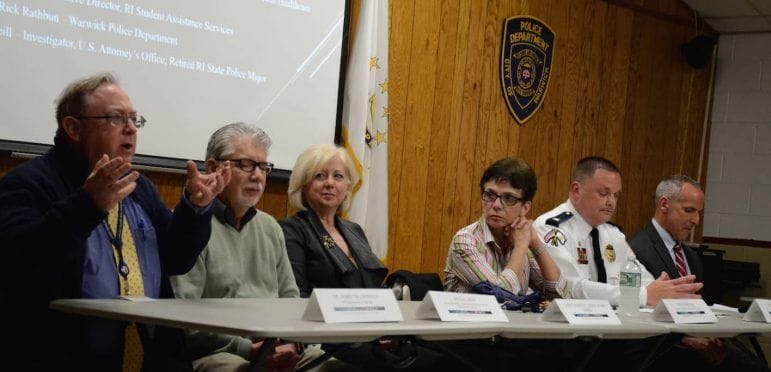
![[CREDIT: Rob Borkowski] From left, Dr. James MacDonald, R.I. Department of Health; Michael Rizzi, treatment and behavioral healthcare expert; Sarah Dinklage, Executive Director, RI Student Assistance Services; Warwick Police Chief Stephen McCartney; Warwick Police Captain Rick Rathbun; David Neill - Investigator, U.S. Attorney’s Office; Retired RI State Police Major.](https://e8dgfhu6pow.exactdn.com/wp-content/uploads/2017/04/Opiod-forum-7.jpg?strip=all&lossy=1&ssl=1)
![[CREDIT: Rob Borkowski] Peter Neronha, former US Attorney, moderated Wednesday night's forum on opioid abuse.](https://e8dgfhu6pow.exactdn.com/wp-content/uploads/2017/04/Opiod-forum-2-336x198.jpg?strip=all&lossy=1&ssl=1)
Mayor Scott Avedisian and Peter Neronha, former US Attorney, spoke briefly about the issue before introducing a 20 min version of the documentary, “Chasing the Dragon,” detailing the addiction, recovery and sometimes fatal relapses of several opioid users.
After, Deborah Parente, who lost her only child, Peter, to opioid and heroin addiction, told the crowd that the stigma of drug addiction often prevents addicts from finding help and making the right choices when they’re in need.
“I am not here saying that recovery isn’t possible, because it is possible, but, after hearing my story, I’m sure you agree, that it’s a constant struggle. You live with this every day for the rest of your life. Help was too late for my son, Peter, but it’s not too late for your children or your loved ones,” Parente said.
Dr. James MacDonald, R.I. Department of Health, said that the one thing the relapsing addicts and their families had in common was their failure to grasp the lingering strength of opioid addiction. Beating it doesn’t happen quickly, or, often, the first time.
“It just doesn’t work like that,” said Dr. James MacDonald.
![[CREDIT: Rob Borkowski]](https://e8dgfhu6pow.exactdn.com/wp-content/uploads/2017/04/Opiod-forum-6.jpg?strip=all&lossy=1&ssl=1)
“It shows the absolute inundation of the community in the number, percentages of drugs,” Rathbun said. Of particular concern, he said, is the increasingly frequent practice of drug producers to cut heroin and cocaine with fentanyl, which is both cheaper and more potent than more widely known opiates such as heroin.
“There’s no such thing as clean heroin out there. You can’t know your dealer that gives you clean drugs anymore,” said Linda Mahoney, administrator of program services for the RI Department of Behavioral Healthcare, Developmental Disabilities and Hospitals (BHDDH).
When people use drugs cut with fentanyl, they’re often surprised by the much more powerful affect of the drug, causing them to overdose more easily, she said.
Rathbun said the numbers show the problem is not just at the state, but at a local level.
In 2016, there were 206 overdose calls, with 10 of them requiring the use of police-issued Narcan, the overdose treatment medication. Ninety-one percent of those cases involved the emergency use of Narcan by Warwick Fire Department personnel, a family member or a friend.
Neronha noted the ease with which average citizens can acquire Narcan at the pharmacy for use in emergencies, as long as they have health insurance coverage.
“The easiest way to do it is to go to CVS or Walgreens, and you have health insurance. Walk up to the counter and say, ‘I was told I could get Narcan here.’ There is a standing order, you don’t need a prescription,” but there may be a negligible co-payment,” Mahoney said you don’t have to be using drugs to carry Narcan doses with you.
Mahoney encouraged people to take advantage of the access to Naran, and to ignore any stigma they may feel by asking for it. “So many people are afraid that if I carry Naloxone (Narcan) people are going to think that I’m using. If I go ask for it, what are they going to think of me. We’re beyond worrying about what people think of you. I mean, we’re at a place where you could safe a life, and if you have the opportunity to do that and you’re in a situation where someone is blue and you don’t have the Naloxone (Narcan) on you, you’re going to wish that you did.”
About three weeks ago, Avedisian said, Warwick saw a large spike in the number of opioid overdose cases over the course of 48 hours. “These are tough issues. They require a lot of discussion and they require everyone in the community to take their rightful spots at the table to make it go away,” Avedisian said.
“The message to parents is, first and foremost, to stay connected,” said Sarah Dinklage, executive director of RI Student Assistance Services. However, she cautioned, make sure to talk to their children organically, as the topic comes up in conversation.
![[CREDIT: Rob Borkowski] The drug drop box in the lobby of Warwick Police HQ,99 Veterans Memorial Drive.](https://e8dgfhu6pow.exactdn.com/wp-content/uploads/2017/04/WPD-drug-drop-box-336x252.jpg?strip=all&lossy=1&ssl=1)
Children and teens who want to be proactive about the problem can initiate their own conversations starting with encouraging their parents to clear old medications out of their medicine cabinets to limit access to the medications for people who may want to abuse them or experiment.
David Neill, an investigator with the U.S. Attorney’s Office and a retired RI State Police Major, warned that people who begin abusing prescription medications are often tempted to use heroin to maintain their addiction by switching to heroin, which is far cheaper.
Illegal prescription pills, he said, can cost $80 per pill, whereas a bag of heroin costs $3 to $7.
People can get rid of unused prescription pills by depositing them in a drop-off box in the Warwick Police Department’s lobby at 99 Veterans Memorial Drive.
“Anybody who has access to any of these opiods, is at risk for making a mistake,” said Michael Rizzi, a treatment and behavioral healthcare expert. He urged people to bear in mind that not only addicts find themselves in an overdose emergency.
![CREDIT: Rob Borkowski] A crowd of about 75 viewed the opioid addiction documentary, "Chasing the Dragon" Wednesday night at WPD Headquarters.](https://e8dgfhu6pow.exactdn.com/wp-content/uploads/2017/04/Opiod-forum-4.jpg?strip=all&lossy=1&ssl=1)
This is a test
